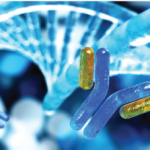
Atacicept failed to improve flare rate or time to first flare in patients with systemic lupus erythematosus (SLE).1 Atacicept is a fusion protein containing the extracellular, ligand-binding portion of the TACI (transmembrane activator and calcium-modulator and cyclophilin-ligand [CAML]-interactor) receptor, and a modified Fc portion of human IgG that blocks BLyS (similar to belimumab). It also contains a B-cell activating factor (a proliferation-inducing ligand [APRIL]). Levels of both APRIL and BlyS are increased in SLE patients, suggesting that blocking both would be more beneficial than blocking either one alone. The agent would also block both plasma and B cells.
This study was a randomized, double-blind, placebo-controlled, Phase 2/3 study in patients with moderate-to-severe SLE. Patients received subcutaneous (SC), twice weekly atacicept 75 mg, atacicept 150 mg or placebo, for four weeks, followed by weekly injections for 48 weeks. The primary outcome measure was the proportion of patients obtaining at least one disease flare during the 52-week trial. The main secondary endpoint was the time to the first flare. The disease flare rate among patients (n=461) treated with 75 mg of atacicept twice weekly was 58% at Week 52. The placebo rate was 54%. The atacicept 150 mg arm was prematurely discontinued due to two deaths. Analysis of the 150 mg atacicept-treated patients suggested a beneficial effect vs. placebo in time to first flare, and flare rates. Both doses of atacicept were associated with decreased total IgG levels, decreased anti-double-stranded DNA (anti-dsDNA) antibody levels and increases in C3 and C4 levels. IgG levels decreased by 30% in the 75 mg atacicept-treated group and by 38% in the 150 mg atacicept-treated group (placebo increased by 3%). Anti-dsDNA also decreased by 31% and 38%, respectively, in the active treatment groups (placebo-treated patients increased by 14%).
Treatment-emergent adverse events were mild to moderate, including upper respiratory infection (17%), urinary tract infection (14%) and headache (16%). The serious infections noted in this study were similar to those seen in both the rituximab and belimumab SLE trials, and the rheumatoid arthritis (RA) atacicept trials. Neither of the two deaths was attributed to study medication.
Mavrilimumab, currently in Phase 2b, is a human monoclonal antibody targeting the alpha subunit of the granulocyte macrophage colony-stimulating factor receptor, which inhibits the mononuclear phagocyte pathway.2 The Phase 2a EARTH study confirmed the efficacy of this agent using ACR20 response, with RA patients showing a rapid clinical response.3 This was a randomized, double-blind, placebo-controlled study in patients (n=239) with moderately active, adult-onset RA, with disease activity score (DAS28-CRP) ≥3.2 for at least a three-month duration despite methotrexate (MTX; dose 7.5–25 mg/week), and positive anticyclic citrullinated peptide antibody >5 IU/mL and/or rheumatoid factor >14 IU/mL. Patients were randomized to receive SC injections every other week of 10, 30, 50 or 100 mg of mavrilimumab or placebo for 12 weeks.


